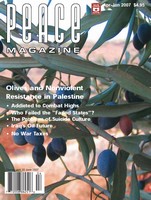
Peace Magazine Apr-Jun 2007, page 29. Some rights reserved.
Search for other articles by David Wurfel here
By Jimmy Carter. New York: Simon and Schuster, 2006.
In calling Israeli policy "apartheid," Jimmy Carter has said what many journalists and opposition politicians have said in Israel, as well as many American and South African commentators, Jewish and gentile. (Some South African Jewish leaders have called Israeli policy "worse than apartheid," pointing especially to the Israeli killings of Palestinians in Gaza in the last year.) What has caused an uproar in some quarters -- the Washington Post called Carter's use of "apartheid" "foolish and unfair"-- is the fact that a highly respected former president has said it, and said it loud and clear. The more authoritative the criticism of Israel, the more vicious the attacks on it.
This is not to say that Carter did not make some tactical compromises. He well knew what provocation he would cause by using "apartheid," and chose to stick by it. However, he downsized the scope of Israeli discrimination by claiming it was limited to the Palestinian Occupied Territories of Gaza, the West Bank and East Jerusalem. Indeed in those areas there are two sets of laws and regulations, one for Israelis and one for Palestinians, in matters of movement, labor, education, land use, etc.
In January it had been the announced intention of the Israeli military to put into effect a new apartheid regulation prohibiting Palestinians from riding in cars with Israeli licenses (aimed particularly at Israeli peace activists, to prevent them from transporting their Palestinian friends.) But in the aftermath of the publication of Carter's book, and the impending Israeli protest, the general responsible for this ordinance decided to "suspend its implementation," perhaps until it is easier to push through.
Sadly, without gaining respite from attacks by the Israeli establishment and its American allies, Carter has ignored the rights of Arab Israelis, who make up one-fifth of Israel's Arab population. His unwarranted concession has triggered new proclamations by Arab mayors and other Arab officials within Israel demanding equal rights. Today Arab Israeli education is separate and most certainly unequal. Land rights are hardly more secure than in the West Bank. Arabs cannot get building permits to build new structures on their own land, while numerous "state purposes" justify the transfer of private Arab land, held by families for generations, to the Israeli state. Access to water is also grossly unequal. The broader purpose behind such policies is better understood when we learn that a plurality of Israelis favor "transfer" (i.e. expulsion) of Israeli Arabs, whether "voluntary" or forced.
Nevertheless, despite its shortcomings, Carter's book is a valuable contribution to public debate in the West on Israeli policies. Most significant is his clear statement that Israeli control of the Occupied Territories is the "primary obstacle" to a peace settlement. He also points out that the US is intensifying anti-Americanism around the globe by condoning Israel colonialism. If these two points were appreciated by a majority of the US Congress--heretofore either purchased or brainwashed by the Israeli Lobby (or both)--the whole thrust of US policy, and thus of events in the Middle East would be different. The prospects for peace would be much greater.
Carter does not leave the Palestinians without responsibilities. He asks Hamas to "accept Israel's right to exist inside pre-1967 borders" and to eschew violence. But he also notes that Israel, which refuses to be limited by the borders accepted by the international community, presents a massive legal obstacle for another state or entity following traditional rules of diplomatic recognition.
Presumably Carter would be satisfied by the recent agreement by Hamas to accept the validity and binding character of previous documents signed by the Palestinian Liberation Organization, including that at Oslo.
But Israel, with US and Canadian support, seems to be able to find every excuse for refusing to deal with the elected government of the Palestinian people. Meanwhile attacks on Carter will continue while those on the attack refuse to debate the substantive issues he raises.
Reviewed by David Wurfel, a retired political science professor living in Toronto.

Peace Magazine Apr-Jun 2007, page 29. Some rights reserved.
Search for other articles by David Wurfel here